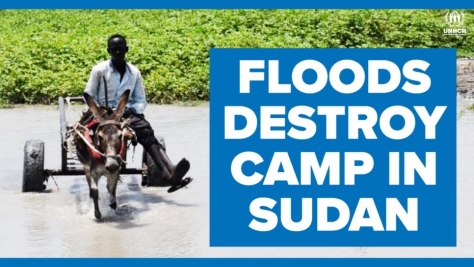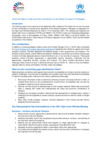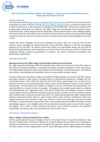Men, women and children suffering from harsh physical conditions and legal shortcomings at Pacific Island asylum centres: UNHCR reports
This is a summary of what was said by UNHCR spokesperson Adrian Edwards – to whom quoted text may be attributed – at today's press briefing at the Palais des Nations in Geneva.
In two reports released today, UNHCR finds that asylum-seekers transferred from Australia to processing centres at Nauru and Manus Island in Papua New Guinea (PNG) are living in arbitrary detention in conditions that do not meet international standards of treatment.
UNHCR understands Australia's determination to respond robustly to the challenges of people smuggling and to dissuade people from undertaking dangerous irregular travel by sea. However we believe those responses must not neglect the compelling protection needs, safety and dignity of the individuals affected.
These reports are also in the context of what UNHCR has observed to be a sharp deterioration during 2013 in the overall quality of protection and support available to asylum-seekers and refugees who come to Australia by boat. It remains the case that when policies and practices are based primarily on deterrence, they can have harmful and, at times, punishing consequences for people affected, particularly families and children.
The reports identify troubling shortcomings at both centres, and urge all three States involved to consider the findings and recommendations and act upon them.
In both Nauru and PNG the current policies, operational approaches and harsh physical conditions at the centres not only do not meet international standards - they also have a profound impact on the men, women and children housed there.
UNHCR is concerned that they constitute mandatory detention which is not compatible with international law. We are also worried that they do not provide a fair and efficient system for assessing refugee claims, do not provide safe and humane conditions of treatment in detention, and do not provide for adequate and timely solutions for recognized refugees.
With the Nauru report, it acknowledges some positive developments since our last visit in March. However, there have also been significant setbacks in refugee processing, and a deterioration in reception conditions. Despite a processing system being in place under Nauru law, only one decision has been handed down in the 14 months since the centre reopened.
No decisions at all have been finalized at the centre in PNG, and while some improvements were observed since UNHCR's last inspection in June, the physical conditions within detention, together with the slowness of processing and the lack of clarity regarding safe and sustainable solutions for refugees were likely, together, to have a serious and negative effect on the health and welfare of people transferred from Australia.
At both centres, the psycho-social well-being of vulnerable people - including survivors of torture and trauma and unaccompanied children - is an issue of concern. UNHCR also called on all three States not to transfer children, particularly those who are unaccompanied, unless and until there has been a marked improvement in conditions in both centres.
UNHCR is particularly concerned by the impact of policies that will prevent recognized refugees from finding safe, dignified and sustainable solutions in the medium to long term. The prospect for refugees in PNG finding permanent protection there presents formidable challenges, and it is clear that Nauru will offer only very limited opportunities for refugees even in the shorter term.
UNHCR believes the arrangements at Nauru and PNG would benefit from a much clearer articulation of the policy and operational framework that would set out how, when and where refugees will be able to secure protection and exercise the rights required under the 1951 Refugee Convention.
The full reports, including recommendations, are available at: www.unhcr.org.au
For more information on this topic, please contact:
- In Canberra (Regional): Ben Farrell on mobile +61 407 971 686
- In Geneva: Adrian Edwards on mobile +41 79 557 91 20
- Babar Baloch on mobile +41 79 557 9106
Related news and stories
Global photo project shows power of football during displacement
The Kenyan powerhouse improving women's lives in Australia
UN refugee chief welcomes cities' support for refugees
UNHCR appeals to Australia to act and save lives at immediate risk
UNHCR urges Australia to end separation of refugee families
'We must believe we can make a difference and we can do things better' - Andrew Harper
-

Refugees count their losses as floods destroy camp in Sudan
22 Nov 2021 -

UNHCR dismayed by deportation of a third Cambodian refugee by Thai Authorities this month
22 Nov 2021 -

Outcome Report - Cities and their contribution to the Global Compact on Refugees (2021)
19 Nov 2021 This report summarizes the outcome of the September 2021 meeting of 210 cities from all over the world on their contributions to achieving the objectives of the Global Compact on Refugees in preparation for the High-Level Officials Meeting to be held on 14-15 December 2021. -

Iranian father and son re-enact their story for Hungarian theatre goers
19 Nov 2021 -

#MohamedSalah is Standing Up for Education
19 Nov 2021 -

Say hello to Professor Salah! Vodafone Foundation-UNHCR Instant Network Schools Ambassador surprises students in Egypt
19 Nov 2021 -

Football star Mo Salah drops in on an Egyptian school
19 Nov 2021 Salah, an Ambassador for Instant Network Schools, pays surprise virtual visit to classroom at a school in his native Egypt. -

UNHCR fixes homes to help Lebanese and refugees weather crisis
18 Nov 2021 As Lebanon suffers a devastating economic collapse, UNHCR is helping struggling Lebanese and Syrian families to live in safety and dignity. -

Summary of Roundtable 1: Virtual launch of the GCR indicator report
18 Nov 2021 This document summarizes the roundtable on the virtual launch of the GCR Indicator report, the first of a series of five preparatory roundtables to be held in the lead-up to the High-Level Officials Meeting.
